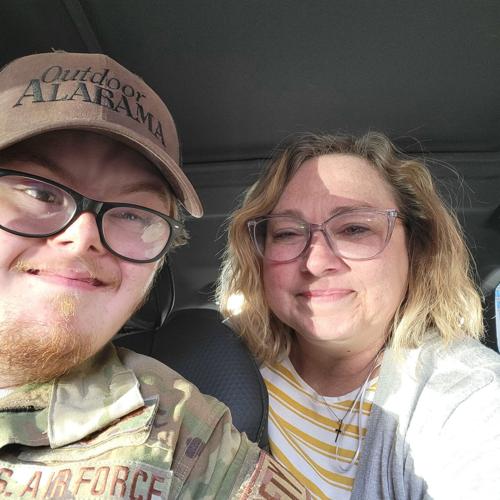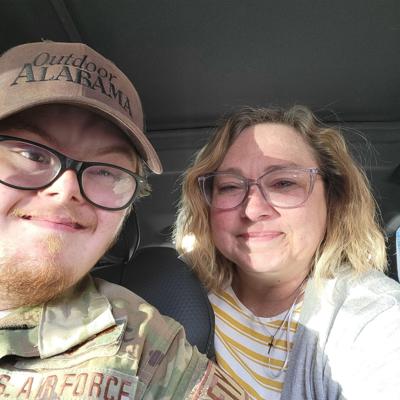Joanna Keeter is counting her blessings.
Her son, CJ, has autism and Down’s syndrome. The Auburn fans traveled to see their favorite team in the Final Four. It was a last minute vacation. She found tickets and it was the biggest expense of the trip. They were staying with life-long friends in their home. The mother and son saw the Tigers lose in the semifinal game. They had tickets to the National Championship game. When they were getting ready to go to church the morning after the loss, CJ, 22, slipped out.
“We had people in different locations of the house,” Keeter said. “We had it covered. He found that one door. When he realized he was out, he decided to go on his own little adventure. The down side is even if he wanted to come back to the house, he probably would not have been able to once he got off the street. He knew nothing of the area.”
CJ was found nine hours later in downtown.

Submitted / TPI Joanna Keeter hugs her son CJ in downtown San Antonia after they were reunited. CJ wandered off and was missing for nine hours.
“He was just having himself a good time,” Keeter said. “To him, the memory isn’t negative. He had a good day and had fun. He didn’t see the down side where we were.”
Keeter said his son is mostly non-verbal.
“It’s like talking to a toddler,” she said. “It sounds like babbling and then you can make out a word.”
In Elmore County, the Keeters are far more equipped. The doorknobs to the home have alarms that alert family to doors opening. And CJ is a client with Project Lifesaver, which includes a wristband radio transmitter law enforcement can use to locate a missing person with dementia or Alzheimer's or children with autism or Down’s syndrome.
The average time to find clients once a Project Lifesaver partner is on the scene is under 15 minutes when they are immediately notified.
The program covers all of Alabama. Locally, the Elmore County Sheriff’s Office is a partner. Keeter rests easy in Alabama because of the program.
“I’m scared, worried that he could walk away, yes,” Keeter said. “But I’m not overly concerned and stressed.”
CJ has been a client for almost five years.
“He wandered off and got into the woods by the neighborhood,” Keeter said. “They were able to use a dog team from the prison and help find him. It took about an hour to an hour and half.”
It’s the incident that got CJ into Project Lifesaver.
The program is free of cost to the clients. The local law enforcement agency has a receiver that works up to about a mile. About two years ago, CJ left home and was found within minutes using the program and quick response of the Elmore County Deputy Sheriff assigned to the Project Lifesaver. The Alabama Law Enforcement Agency Aviation Unit has equipment to pick up the signal up to about 10 miles away and can assist from the air in about half an hour.
The helicopter isn’t needed too often as lost clients are usually found in less than a half hour once the partner agency gets on the ground.
“It works best if you call them right away before they can get too far,” Keeter said. “Alabama is a 100% state. Anywhere in the state the program is there.”
In Elmore County, deputy sheriff Stephen Dudley manages the program. He has used it with his mother.
“It is a wonderful tool for caretakers,” Dudley said. “It provides a great safety net knowing how quickly it works.”
Locally, Dudley gets called out about three to four times a year and rarely is the ALEA helicopter called to aid in a search.
CJ is one of 11 and soon-to-be 12 clients in Elmore County with wristbands for the program.
“We would like more, but they are more than $350 a piece,” Dudley said. “We have some grants but are looking at more.”
The sheriff’s office provides the first and second wristband just in case the client cuts it off. After that it is up to the family to cover the cost.
Law enforcement in San Antonio is not a partner with Project Lifesaver.
In the first few hours of the search for CJ, his mother, law enforcement and others went the direction CJ was seen going on security footage. She was also practically trying to find a partner with Project Lifesaver to bring a handheld device to the scene. When she was able to locate one, the search was already hours old and CJ was now beyond the range of the equipment.
“Let’s be real, when I’m going through this I’m not thinking straight,” Keeter said. “I’m not breaking it down. You are not thinking of the things correctly. You are distraught, numb and can't think straight.”
Keeter put a post on Facebook after five hours into the saga about CJ being missing.
“I debated posting because I was in San Antonio compared to home,” Keeter said. “I thought people were at home and can’t help. I decided to post because I wanted the prayers. We believe in prayer and the power of prayer. If the prayer could help, then at least let's get that going.”
Soon the post was shared thousands of times. The post traveled from Alabama to San Antonio.
Before long CJ was spotted in downtown San Antonio almost six miles from the home he was staying in with his mother and completely the other direction from where the searches were going on.
“At some point he went the opposite direction and it took him downtown,” Keeter said. “I’m sure once he got there he realized there was a lot of fun there. He was enjoying himself it seems.”
The mother and son were connected via phone until she could travel the 15 or so minutes to be there in person.
“That hug was a relief,” Keeter said. “I think through the majority of the day, there was so much numbness. You automatically take yourself to the worst case scenario and hope for the best.”
Along the route CJ took were buses going all over town. There was an interstate nearby to provide more means of transportation and more safety issues.
“The prayers worked,” Keeter said. “In this case social media worked. I firmly believe it found my child. I will forever be thankful and grateful. It is because of the sharing and then everyone else sharing. It just kind of built and built.”
Keeter is thankful for family, friends and strangers sharing her post and helping find her son. But she is also convinced Project Lifesaver will provide a quicker result if it is ever needed again.
“I firmly believe if we had been at home, the search would not have been as lengthy as it was,” Keeter said. “We would have had a partner on scene quickly and a helicopter above if it was needed.”






